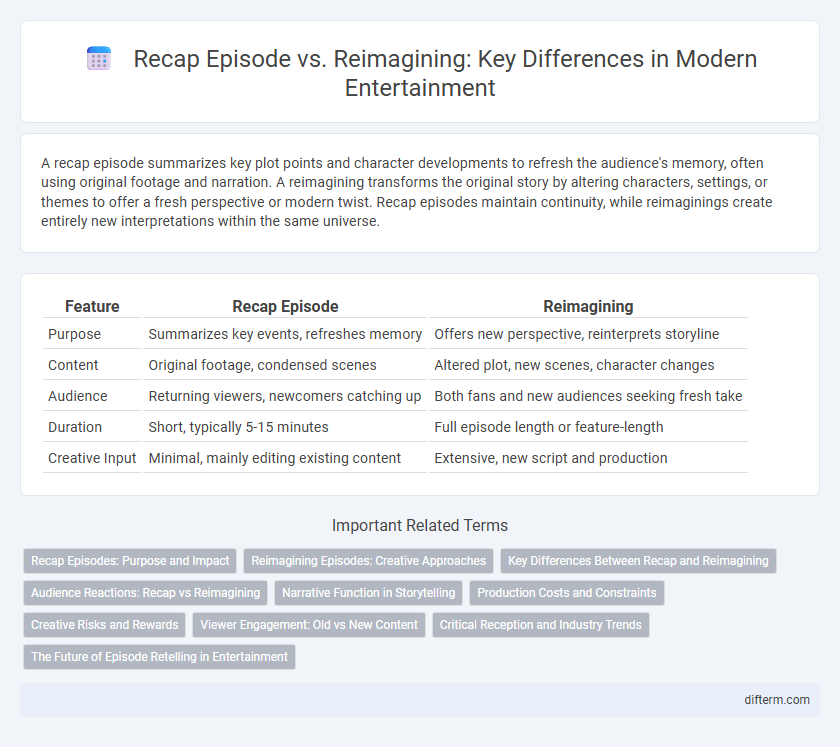A recap episode summarizes key plot points and character developments to refresh the audience's memory, often using original footage and narration. A reimagining transforms the original story by altering characters, settings, or themes to offer a fresh perspective or modern twist. Recap episodes maintain continuity, while reimaginings create entirely new interpretations within the same universe.
Table of Comparison
| Feature | Recap Episode | Reimagining |
|---|---|---|
| Purpose | Summarizes key events, refreshes memory | Offers new perspective, reinterprets storyline |
| Content | Original footage, condensed scenes | Altered plot, new scenes, character changes |
| Audience | Returning viewers, newcomers catching up | Both fans and new audiences seeking fresh take |
| Duration | Short, typically 5-15 minutes | Full episode length or feature-length |
| Creative Input | Minimal, mainly editing existing content | Extensive, new script and production |
Recap Episodes: Purpose and Impact
Recap episodes serve as essential narrative tools by summarizing key plot points, helping viewers stay engaged and refreshed, particularly in complex or long-running series. These episodes reinforce character development and pivotal events, enhancing audience understanding and emotional investment. By providing a concise overview, recap episodes also facilitate smoother transitions between story arcs, boosting viewer retention and anticipation.
Reimagining Episodes: Creative Approaches
Reimagining episodes employ innovative storytelling techniques by altering characters, settings, or plotlines to offer fresh perspectives on familiar narratives. This creative approach often involves enhanced visual effects, updated dialogue, and contemporary themes to engage modern audiences. By transforming original content, reimagined episodes stimulate renewed interest and deepen emotional connections with viewers.
Key Differences Between Recap and Reimagining
A recap episode summarizes previous plot points to refresh viewers' memories, while a reimagining reinvents the original story with new characters, settings, or perspectives, creating a fresh narrative experience. Recap episodes rely heavily on existing footage and dialogue, aiming to condense and clarify, whereas reimagining involves creative reinterpretation, often expanding or altering key themes and story arcs. The primary difference lies in purpose: recaps facilitate continuity and understanding, while reimaginings seek to offer innovative storytelling and attract new audiences.
Audience Reactions: Recap vs Reimagining
Audience reactions to recap episodes often center on nostalgia and a desire for clarity, as viewers appreciate revisiting key plot points to reinforce their understanding. In contrast, reimagining episodes elicit a mix of intrigue and skepticism, with fans intrigued by fresh perspectives but cautious about deviations from the original narrative. The engagement levels tend to vary, with recap episodes providing comfort through familiarity, while reimaginings challenge audience expectations and invite deeper discussion.
Narrative Function in Storytelling
Recap episodes serve a crucial narrative function by reinforcing key plot points and character developments, ensuring audience comprehension and continuity within complex story arcs. Reimagining episodes transform original narratives to explore alternative perspectives or deepen thematic elements, enriching storytelling through fresh interpretations. Both techniques enhance engagement and narrative depth, but while recaps consolidate existing storylines, reimaginings expand the narrative universe.
Production Costs and Constraints
Recap episodes offer a cost-effective solution by repurposing existing footage, significantly reducing production expenses compared to full reimagining projects that require new sets, actors, and extensive crew involvement. Reimagining demands higher budgets due to creative redesigns, comprehensive scripting, and advanced special effects, often pushing production timelines and financial constraints. Production teams must balance these factors, weighing the cost-efficiency of recap episodes against the creative ambition and resource intensity of reimagined content.
Creative Risks and Rewards
Recap episodes offer a low-risk way to engage audiences by reinforcing familiar storylines, boosting viewer retention without demanding extensive new content. Reimagining a series involves significant creative risks as it challenges established narratives, but it can yield high rewards through fresh storytelling, attracting new demographics and revitalizing franchise relevance. Both approaches balance innovation and continuity, influencing fan loyalty and the potential for long-term franchise success.
Viewer Engagement: Old vs New Content
Recap episodes reinforce viewer engagement by summarizing key plot points and refreshing audience memory, particularly beneficial for long-running series with complex storylines. Reimagining content attracts both existing fans and new viewers by offering fresh perspectives and updated narratives that resonate with contemporary tastes. Balancing old and new content strategies enhances sustained interest and broadens demographic appeal in entertainment media.
Critical Reception and Industry Trends
Recap episodes often receive mixed critical reception due to their reliance on previously aired content, which can lead to viewer fatigue, whereas reimagining series tend to garner more favorable reviews for offering fresh perspectives and creative innovation. Industry trends reveal a growing preference for reimagined content as streaming platforms invest in rebooting classic franchises to attract diverse audiences and capitalize on nostalgia while delivering new narratives. Critical acclaim frequently highlights the success of reimagining efforts in revitalizing established IPs, driving subscriber engagement, and influencing content production strategies across entertainment networks.
The Future of Episode Retelling in Entertainment
Recap episodes condense key plot developments to reengage audiences and maintain continuity, while reimagining transforms original narratives with fresh perspectives, often attracting new viewers and revitalizing franchises. Advances in streaming platforms and AI-driven content personalization are shaping the future of episode retelling by enabling tailored, immersive experiences that blend summary and creative reinterpretation. This evolution enhances viewer engagement and expands storytelling possibilities within the entertainment industry.
Recap episode vs reimagining Infographic

 difterm.com
difterm.com